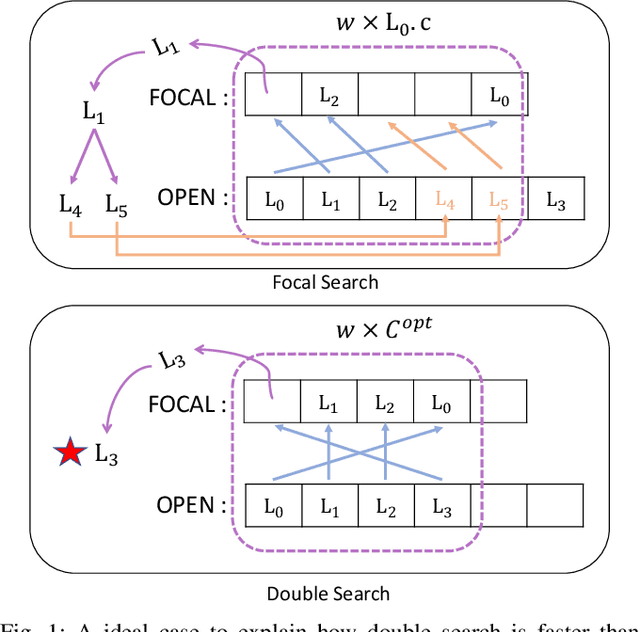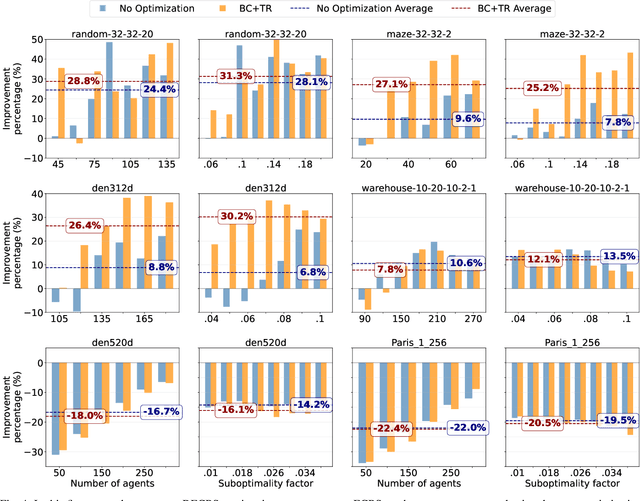Sven Koenig
Judgelight: Trajectory-Level Post-Optimization for Multi-Agent Path Finding via Closed-Subwalk Collapsing
Jan 27, 2026Abstract:Multi-Agent Path Finding (MAPF) is an NP-hard problem with applications in warehouse automation and multi-robot coordination. Learning-based MAPF solvers offer fast and scalable planning but often produce feasible trajectories that contain unnecessary or oscillatory movements. We propose Judgelight, a post-optimization method that improves trajectory quality after a MAPF solver generates a feasible schedule. Judgelight collapses closed subwalks in agents' trajectories to remove redundant movements while preserving all feasibility constraints. We formalize this process as MAPF-Collapse, prove that it is NP-hard, and present an exact optimization approach by formulating it as integer linear programming (ILP) problem. Experimental results show Judgelight consistently reduces solution cost by around 20%, particularly for learning-based solvers, producing trajectories that are better suited for real-world deployment.
An Anytime, Scalable and Complete Algorithm for Embedding a Manufacturing Procedure in a Smart Factory
Oct 02, 2025


Abstract:Modern automated factories increasingly run manufacturing procedures using a matrix of programmable machines, such as 3D printers, interconnected by a programmable transport system, such as a fleet of tabletop robots. To embed a manufacturing procedure into a smart factory, an operator must: (a) assign each of its processes to a machine and (b) specify how agents should transport parts between machines. The problem of embedding a manufacturing process into a smart factory is termed the Smart Factory Embedding (SFE) problem. State-of-the-art SFE solvers can only scale to factories containing a couple dozen machines. Modern smart factories, however, may contain hundreds of machines. We fill this hole by introducing the first highly scalable solution to the SFE, TS-ACES, the Traffic System based Anytime Cyclic Embedding Solver. We show that TS-ACES is complete and can scale to SFE instances based on real industrial scenarios with more than a hundred machines.
LSPO: Length-aware Dynamic Sampling for Policy Optimization in LLM Reasoning
Oct 01, 2025Abstract:Since the release of Deepseek-R1, reinforcement learning with verifiable rewards (RLVR) has become a central approach for training large language models (LLMs) on reasoning tasks. Recent work has largely focused on modifying loss functions to make RLVR more efficient and effective. In this paper, motivated by studies of overthinking in LLMs, we propose Length-aware Sampling for Policy Optimization (LSPO), a novel meta-RLVR algorithm that dynamically selects training data at each step based on the average response length. We evaluate LSPO across multiple base models and datasets, demonstrating that it consistently improves learning effectiveness. In addition, we conduct a detailed ablation study to examine alternative ways of incorporating length signals into dynamic sampling, offering further insights and highlighting promising directions for future research.
Discrete-Guided Diffusion for Scalable and Safe Multi-Robot Motion Planning
Aug 27, 2025



Abstract:Multi-Robot Motion Planning (MRMP) involves generating collision-free trajectories for multiple robots operating in a shared continuous workspace. While discrete multi-agent path finding (MAPF) methods are broadly adopted due to their scalability, their coarse discretization severely limits trajectory quality. In contrast, continuous optimization-based planners offer higher-quality paths but suffer from the curse of dimensionality, resulting in poor scalability with respect to the number of robots. This paper tackles the limitations of these two approaches by introducing a novel framework that integrates discrete MAPF solvers with constrained generative diffusion models. The resulting framework, called Discrete-Guided Diffusion (DGD), has three key characteristics: (1) it decomposes the original nonconvex MRMP problem into tractable subproblems with convex configuration spaces, (2) it combines discrete MAPF solutions with constrained optimization techniques to guide diffusion models capture complex spatiotemporal dependencies among robots, and (3) it incorporates a lightweight constraint repair mechanism to ensure trajectory feasibility. The proposed method sets a new state-of-the-art performance in large-scale, complex environments, scaling to 100 robots while achieving planning efficiency and high success rates.
Multi-Agent Path Finding Among Dynamic Uncontrollable Agents with Statistical Safety Guarantees
Jul 29, 2025



Abstract:Existing multi-agent path finding (MAPF) solvers do not account for uncertain behavior of uncontrollable agents. We present a novel variant of Enhanced Conflict-Based Search (ECBS), for both one-shot and lifelong MAPF in dynamic environments with uncontrollable agents. Our method consists of (1) training a learned predictor for the movement of uncontrollable agents, (2) quantifying the prediction error using conformal prediction (CP), a tool for statistical uncertainty quantification, and (3) integrating these uncertainty intervals into our modified ECBS solver. Our method can account for uncertain agent behavior, comes with statistical guarantees on collision-free paths for one-shot missions, and scales to lifelong missions with a receding horizon sequence of one-shot instances. We run our algorithm, CP-Solver, across warehouse and game maps, with competitive throughput and reduced collisions.
New Mechanisms in Flex Distribution for Bounded Suboptimal Multi-Agent Path Finding
Jul 22, 2025



Abstract:Multi-Agent Path Finding (MAPF) is the problem of finding a set of collision-free paths, one for each agent in a shared environment. Its objective is to minimize the sum of path costs (SOC), where the path cost of each agent is defined as the travel time from its start location to its target location. Explicit Estimation Conflict-Based Search (EECBS) is the leading algorithm for bounded-suboptimal MAPF, with the SOC of the solution being at most a user-specified factor $w$ away from optimal. EECBS maintains sets of paths and a lower bound $LB$ on the optimal SOC. Then, it iteratively selects a set of paths whose SOC is at most $w \cdot LB$ and introduces constraints to resolve collisions. For each path in a set, EECBS maintains a lower bound on its optimal path that satisfies constraints. By finding an individually bounded-suboptimal path with cost at most a threshold of $w$ times its lower bound, EECBS guarantees to find a bounded-suboptimal solution. To speed up EECBS, previous work uses flex distribution to increase the threshold. Though EECBS with flex distribution guarantees to find a bounded-suboptimal solution, increasing the thresholds may push the SOC beyond $w \cdot LB$, forcing EECBS to switch among different sets of paths instead of resolving collisions on a particular set of paths, and thus reducing efficiency. To address this issue, we propose Conflict-Based Flex Distribution that distributes flex in proportion to the number of collisions. We also estimate the delays needed to satisfy constraints and propose Delay-Based Flex Distribution. On top of that, we propose Mixed-Strategy Flex Distribution, combining both in a hierarchical framework. We prove that EECBS with our new flex distribution mechanisms is complete and bounded-suboptimal. Our experiments show that our approaches outperform the original (greedy) flex distribution.
A Preprocessing Framework for Efficient Approximate Bi-Objective Shortest-Path Computation in the Presence of Correlated Objectives
May 28, 2025



Abstract:The bi-objective shortest-path (BOSP) problem seeks to find paths between start and target vertices of a graph while optimizing two conflicting objective functions. We consider the BOSP problem in the presence of correlated objectives. Such correlations often occur in real-world settings such as road networks, where optimizing two positively correlated objectives, such as travel time and fuel consumption, is common. BOSP is generally computationally challenging as the size of the search space is exponential in the number of objective functions and the graph size. Bounded sub-optimal BOSP solvers such as A*pex alleviate this complexity by approximating the Pareto-optimal solution set rather than computing it exactly (given a user-provided approximation factor). As the correlation between objective functions increases, smaller approximation factors are sufficient for collapsing the entire Pareto-optimal set into a single solution. We leverage this insight to propose an efficient algorithm that reduces the search effort in the presence of correlated objectives. Our approach for computing approximations of the entire Pareto-optimal set is inspired by graph-clustering algorithms. It uses a preprocessing phase to identify correlated clusters within a graph and to generate a new graph representation. This allows a natural generalization of A*pex to run up to five times faster on DIMACS dataset instances, a standard benchmark in the field. To the best of our knowledge, this is the first algorithm proposed that efficiently and effectively exploits correlations in the context of bi-objective search while providing theoretical guarantees on solution quality.
Accelerating Focal Search in Multi-Agent Path Finding with Tighter Lower Bounds
Mar 04, 2025



Abstract:Multi-Agent Path Finding (MAPF) involves finding collision-free paths for multiple agents while minimizing a cost function--an NP-hard problem. Bounded suboptimal methods like Enhanced Conflict-Based Search (ECBS) and Explicit Estimation CBS (EECBS) balance solution quality with computational efficiency using focal search mechanisms. While effective, traditional focal search faces a limitation: the lower bound (LB) value determining which nodes enter the FOCAL list often increases slowly in early search stages, resulting in a constrained search space that delays finding valid solutions. In this paper, we propose a novel bounded suboptimal algorithm, double-ECBS (DECBS), to address this issue by first determining the maximum LB value and then employing a best-first search guided by this LB to find a collision-free path. Experimental results demonstrate that DECBS outperforms ECBS in most test cases and is compatible with existing optimization techniques. DECBS can reduce nearly 30% high-level CT nodes and 50% low-level focal search nodes. When agent density is moderate to high, DECBS achieves a 23.5% average runtime improvement over ECBS with identical suboptimality bounds and optimizations.
RAILGUN: A Unified Convolutional Policy for Multi-Agent Path Finding Across Different Environments and Tasks
Mar 04, 2025



Abstract:Multi-Agent Path Finding (MAPF), which focuses on finding collision-free paths for multiple robots, is crucial for applications ranging from aerial swarms to warehouse automation. Solving MAPF is NP-hard so learning-based approaches for MAPF have gained attention, particularly those leveraging deep neural networks. Nonetheless, despite the community's continued efforts, all learning-based MAPF planners still rely on decentralized planning due to variability in the number of agents and map sizes. We have developed the first centralized learning-based policy for MAPF problem called RAILGUN. RAILGUN is not an agent-based policy but a map-based policy. By leveraging a CNN-based architecture, RAILGUN can generalize across different maps and handle any number of agents. We collect trajectories from rule-based methods to train our model in a supervised way. In experiments, RAILGUN outperforms most baseline methods and demonstrates great zero-shot generalization capabilities on various tasks, maps and agent numbers that were not seen in the training dataset.
Jointly Assigning Processes to Machines and Generating Plans for Autonomous Mobile Robots in a Smart Factory
Feb 28, 2025

Abstract:A modern smart factory runs a manufacturing procedure using a collection of programmable machines. Typically, materials are ferried between these machines using a team of mobile robots. To embed a manufacturing procedure in a smart factory, a factory operator must a) assign its processes to the smart factory's machines and b) determine how agents should carry materials between machines. A good embedding maximizes the smart factory's throughput; the rate at which it outputs products. Existing smart factory management systems solve the aforementioned problems sequentially, limiting the throughput that they can achieve. In this paper we introduce ACES, the Anytime Cyclic Embedding Solver, the first solver which jointly optimizes the assignment of processes to machines and the assignment of paths to agents. We evaluate ACES and show that it can scale to real industrial scenarios.
 Add to Chrome
Add to Chrome Add to Firefox
Add to Firefox Add to Edge
Add to Edge